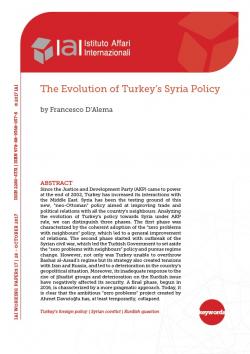The Evolution of Turkey's Syria Policy
Since the Justice and Development Party (AKP) came to power at the end of 2002, Turkey has increased its interactions with the Middle East. Syria has been the testing ground of this new, “neo-Ottoman” policy aimed at improving trade and political relations with all the country’s neighbours. Analyzing the evolution of Turkey’s policy towards Syria under AKP rule, we can distinguish three phases. The first phase was characterized by the coherent adoption of the “zero problems with neighbours” policy, which led to a general improvement of relations. The second phase started with outbreak of the Syrian civil war, which led the Turkish Government to set aside the “zero problems with neighbours” policy and pursue regime change. However, not only was Turkey unable to overthrow Bashar al-Assad’s regime but its strategy also created tensions with Iran and Russia, and led to a deterioration in the country’s geopolitical situation. Moreover, its inadequate response to the rise of jihadist groups and deterioration on the Kurdish issue have negatively affected its security. A final phase, begun in 2016, is characterized by a more pragmatic approach. Today, it is clear that the ambitious “zero problems” project created by Ahmet Davutoğlu has, at least temporarily, collapsed.
-
Details
Roma, IAI, October 2017, 17 p. -
Issue
17|28 -
ISBN/ISSN/DOI:
978-88-9368-057-8
Introduction
1. Zero problems with neighbours (2002–11)
2. Regime change (2011–16)
3. Recent developments (2016–present)
Conclusions
References



